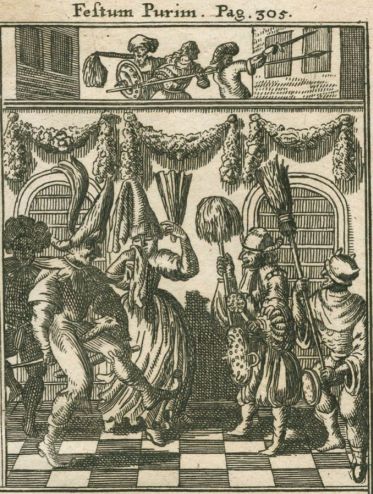| | NEWS
The Miracles of Purim
by HaRav Shlomo Brevda zt"l

In honor of Purim, we present these translations and excerpts from HaRav Brevda's world famous shiurim on Purim, and his best-selling sefer on Megillas Esther and Purim — Kiymu Vekiblu — which was reprinted many times. They provide a deep insight into the underlying lessons of Purim. The material has been prepared specially for Yated, and some of it has never before appeared in print.
This was first published about 30 years ago.
For Part II of this series click here.
Part I
Klal Yisroel sinned but Hashem prepared the refuah considerably in advance of the macco that threatened them. The entire Megilla shows how seemingly unrelated events were eventually, as a result of HaKodosh Boruch Hu's eitza, used to save Klal Yisroel and to cause the downfall of their enemies.
The entire government of Achashverosh's vast empire was moved to Shushan because that was where Mordechai and Esther were. Two very difficult achievements were necessary for the atzas Hashem: Vashti must be out of the way, and Esther must be installed in her place. These were both quite impossible-looking goals, as was explained.
However, Hashem was turning screws. Achashverosh was trying to live down his past as a stable boy, and held a big feast. Then he held another feast for the people of Shushan, at which he displayed himself as a "man of the people," (in order to aggrandize himself) by declaring that everyone could have whatever he wanted. His pride was rising to tremendous heights, at the same time that Vashti his queen was getting fed up with him. Hashem was clearly planning a clash.

A Prisoner Of His Own Motto
Vashti miscalculated. The hall which she had chosen for her party, happened to adjoin the banquet hall where Achashverosh was rejoicing with all of the men. The women's voices were therefore, overheard by the men.
The men began talking about their women. The gemora says that the talk developed like this. One man said, "My wife is a Persian. Persian women are the most beautiful."
Another, who was drinking with him at the same table, said, "Mine is from Madai. They are the most beautiful women."
There was another Persian and another Madai, and another and another. They all began shouting at each other, until Achashverosh finally asked, "What are people shouting about?" (Isn't everybody happy?)
He was informed that there was a violent argument about who the most beautiful women were, whether from Paras or from Madai. Achashverosh's wife was neither Persian nor Madai. She was from Bovel. He and his wife had to be better and greater than everyone! He began to boast, "Mine is neither from Paras or Madai. She is a Babylonian, and there is no one as beautiful as she in the world."
They all cried out, "Prove it. Bring her in, and have her reveal herself fully to us!"
Normally, Achashverosh would never have consented to such an outrageous demand. It was far beneath his pride and dignity — an outright desecration of the kingdom.
But he had no choice. The expressed motto of this mishte was that every man's desires shall be fulfilled. Should he now refuse to fulfill the unanimous desire of his guests — the people of Shushan — his credibility would be damaged beyond repair. All of the money (millions), time, planning, and energy that he had put into his extravagant parties to gain the love and loyalty of Shushan — all would have been in vain.
He was trapped. He was a prisoner of his own motto. Hashem was tightening the screws. Achashverosh sent his officers to Vashti, demanding that she come...
The fact is, that on any other day she would not have hesitated to display herself in public. She was a very loose individual, of very low morality. However, since Hashem had "injected" her with extreme arrogance on that day, she would not come. On that day, if he said, "Come," she must answer: "I shall not!"
She was a prisoner of her own motto of the day, that a wife should not give in to her husband's demands.
"Atzas Hashem" has caused both Achashverosh and Vashti to be virtual prisoners of their mutual mottoes!
She therefore replied: "Tell him that I shall not be coming!" And in her great arrogance she added, "Tell him that I am of royal lineage. My father was a true king, the son of a king. At a royal feast, he drank toasts with every single one of his 1,000 guests, and he did not become drunk, because he was royalty. He could hold his wine. Stable boy that you are! You had a few drinks and you are in a drunken stupor!"
The "teacher" has spoken! When he received her message, the posuk says — "he shouted, and his anger burnt within him."
The gemora asks, why was his anger burning within him? The gemora then reveals the abusive contents of the message that Vashti sent to Achashverosh.
The Gaon says that the gemora's question really is as follows: The usual order of events with anger is: first, you burn within, and then you shout. Once you have let the steam out, you calm down. Here it says the exact opposite. First he shouted, "She is not obeying my command!" and then he burnt "within." This is why the gemora asks — why is he so furious "within," if he has already burst out?
The gemora answers that he could only shout about the fact that she disobeyed him. However, there was something else that he could not shout about in public — her words of abuse: "You stable boy!" She reminded him of his past, his humble beginnings, when he was no more than a stable boy. He was concerned that his 187 day extravaganza to erase his past history would all go down the drain.
What could he do? He could not rant and rave over her words of abuse, since it would ruin his reputation and reveal his past.
Look at what Hashem yisborach is doing! The man is getting angrier and angrier, and he must vent his anger, but he cannot! If he will not get his anger out, he will do something foolish, something self destructive. All the screws are turning.
What will he do here? He has to save his reputation. But what about his wife's life? He would like to save that as well. However he realizes that there is a conflict here. If she remains alive after disobeying him in public, his worldwide prestige and authority are destroyed. But if he kills her, again he is no longer a true royal king — he does not have a royal queen. What will he do?
The Gaon says that there was a very wise law in Paras and Madai. It said that a king can have people executed without a court trial, if they have committed a crime against the kingdom. But if they have insulted him personally or done something personally to him, he could not execute them without a court verdict.
Why did they adopt that law? That law was to prevent the execution of ministers for no good reason at all. A minister could come in one day, and if the King was in a bad mood he could simply say, "I don't like you anymore. I feel that without a head you would be more handsome." And that would be that.
Woodcut from 1657

The law therefore required that if in cases of a personal crime against the King, he had to take the issue to a court of law. That was the life insurance of the ministers. They were very happy with that law, and the Gaon says that it was a wise law. That law did not allow Achashverosh to kill Vashti simply because she had insulted him and refused to come when he called for her to come. He had to present his case before a court of law.
Even in the stupor of his drink and anger, he was in a battle with Hashem yisborach. The Eibershter wanted Vashti to be executed, but Achashverosh was insisting, "I am not going to kill her."
Who is going to win this battle?
A voice can be heard in the Heavens. The time has come for Achashverosh to execute Vashti, the evil and wicked descendant of Nebukhadnezzar the rosho. However, Achashverosh, the ingenious manipulator and brilliant politician, has a plan. Should his plan succeed, Vashti would remain alive, and at the same time, his kingdom, authority and prestige would remain intact. Hashem yisborach, however, has other plans...
There is Law and There is Politics
The Gaon explains that Achashverosh had the option of bringing this case before one of two different courts. One court followed the letter of the law. That court would have certainly ordered that she be executed, at once. A queen who does not respond to a direct order from the king — is finished.
However, there was a second court available to Achashverosh. The judgments of this court were based upon political expedience. Those judges were entirely political in their verdicts. If it paid, they were silent. If it paid, they were vociferous. They were real pros. They knew how to work out all problems. They could easily have found a solution that would have kept Queen Vashti alive, and left King Achashverosh great.
Naturally, Achashverosh referred Vashti's case to the political court — with a subtle hint. He asked them, "Ma la'asos bamalka Vashti?" He placed the word "queen" before the word "Vashti," instead of referring to her at "Vashti hamalka," her usual title. He was hinting to them — "remember that she is `The Queen.'" He was clearly indicating to them that their verdict must allow her to remain The Queen (i.e. alive).
This court had seven members. They were superb diplomats, accomplished politicians. Just prior to this incident, Hashem arranged that one of these judges left. To fill his place on the bench, a young, ambitious politician was chosen. When expressing opinions, the most senior judge would speak first, then the second one, etc. The seventh judge, being a freshman, would speak last.
Who was this seventh individual? His name, temporarily, was "Memuchan." It would soon turn into "Haman."

Another Upstart
What credentials did he possess? How did Haman reach such a high position in government? What was his esteemed profession before that? Alas, he was a barber, a hairdresser. (We now have a stable boy and a hairdresser!)
Haman's astounding success can be attributed to a good marriage. His wife was a Persian woman, Zeresh, who happened to be one of the cleverest women in the world. What she saw in him, we do not know.
She decided that Haman was not going to remain a mere hairdresser. She guided him and advised him, and he entered politics and government. Eventually, he was elected to be one of the seven most influential people in the kingdom.
Haman was from Amolek, the most cruel and evil nation on earth. For one thing, he probably hated his wife for all that she had done for him. He owed her too much. For another thing, she was much wiser than he, capable of defeating him in any debate. This, most probably, aroused in him great animosity towards her. Number three, he was a proud, devout "Amoleki," and he desired to speak the language of Amolek in his home. She, however, refused to comply with this desire of his, and insisted on speaking Persian, the language of her nation.
Haman suddenly found himself in a position where he was part of a tribunal that was to decide the fate of a wife who disobeyed her husband. The instinct of revenge, in Haman-Amolek, was kindled into a roaring flame.
Instead of awaiting his rightful turn to speak (last), the posuk says, "Vayomer Memuchan lifnei hamelech vehasorim." "Lifnei," can mean: in front of them, in space. It can also mean: before them, in time.
The Gaon says that in this posuk it means before them, in time. Instead of speaking last, as the junior member of the court, he began speaking first. A lower individual is often impulsive and compulsive, lacking patience and self-control.
Hashem yisborach was now turning many screws, simultaneously: Achashverosh, Vashti, and now — Haman.
What did Haman say? He argued against the very law, in principle. A king, he submitted, is not just like any other person. A king is the leader of the entire people, and an affront to him is an affront to the entire kingdom, and will affect the whole population.
"For example, in this case, the Queen disobeyed the King. To be sure, she insulted the King personally, but it will not end there. Should the King tolerate her action, we can imagine what will happen next. Every wife of a minister or officer in all of the 127 countries will follow her lead, and will also rebel against her husband, expecting him to follow the King's lead and tolerate it. The result will be a national rebellion. This is not simply a personal affront to the King, but rather, an issue of national security and survival!
"I, therefore, propose a change in the law. Henceforth, the King shall have the right to punish or execute anyone he wishes, for any reason at all, including a personal affront. I also propose that the first time that the King uses his new powers shall be today, when he declares, `Vashti, I commanded you to come to me, and you did not come. I hereby decree that you shall never come to me again.' That is to say she will be put to death.
"Moreover, I propose that a royal decree be sent to all 127 countries, declaring that every man shall be the ruler in his own house, and speak his own language."
Chazal comment to us that since every man was, indeed, the ruler in his own house, upon reading this royal decree people considered the King to be quite foolish. This fact virtually saved the lives of the Jewish people at a later date.
How? When Haman's evil decree, containing the seal of Achashverosh, subsequently reached these goyim, stating that a later date they shall do to the Yidden what he has planned — they never would have waited. These vicious antisemites would have gone out the very next morning and done it immediately. Instead, they hesitated. Why?
After receiving the previous royal decree, they were not at all certain if the second decree was signed by a responsible monarch, or not. This doubt cause them to wait until the situation would be clarified. Thus, our lives were spared, and this was part of the miracle of Purim.
Back to Vashti's trial. Haman had proposed two things: a change in the law, and that Vashti be executed. That change in the law took away the security, peace of mind, and life insurance that the ministers, judges and officers had until now. Henceforth, no officer or minister who comes before the King could be sure to come out alive. Who knows what mood the King will be in?
In truth, the King should have executed Haman, on the spot, claiming, "I could have gotten such a verdict from the other court. Why did I refer Vashti's case to your diplomatic court? To get me out of hot water! Don't you understand? Vashti must remain alive, at all costs, and your advice is that I should kill her? Is that what I needed you for? Is that why you spoke out of turn?"
However, what does the posuk say? "They all wholeheartedly agreed with Haman's proposals!" The King is delighted to kill his wife! The other judges are most pleased with a law that puts their very lives in jeopardy!
The Gaon comments that there is not one ounce of normality in all of this. Atzas Hashem is in full gear.
Vashti was put to death.
The Later Consequences of the New Law
The change in the law concerning royal executions, as proposed by Haman, had put an end to the life of the evil Queen Vashti. Years later, Haman's law would be the cause of an act of much greater significance, indeed.
At the end, when Achashverosh became enraged at Haman, after Esther's revelation and appeal, suddenly Eliyahu Hanovi appeared, disguised as Charvona, an associate of Haman. He related to the King, "Your Highness, this morning you gave great kovod to Mordechai haYehudi. Why? Because he is your loyal and devoted subject. He was the only person who revealed the plot to put poison in your food. He saved the King's very life.
"Last night, Haman erected a tall gallows, 100 feet high, from which to hang Mordechai, who saved the life of the King. Why should Haman plan to get rid of Mordechai? Most probably, Haman is now plotting against the King. Knowing that your devoted subject Mordechai is capable of revealing plots to the King, he decided to do away with him. He purposely built a very tall gallows, so that the entire population would see the demise of Mordechai, the informer. Thus, no one, in the future, would dare to inform the King of Haman's plot."
The King, realizing that his life was being threatened by Haman, proclaimed, "Hang Haman on that gallows!"
"But the King is obligated, to refer this to a court, since it is a personal matter."
"I am not. Haman's own proposal changed the law. I can order anyone to be executed!"
Thus, Haman prepared the law which enabled his execution. He also prepared the gallows on which he was hanged.
Atzas Hashem!!
End of Part I
|




